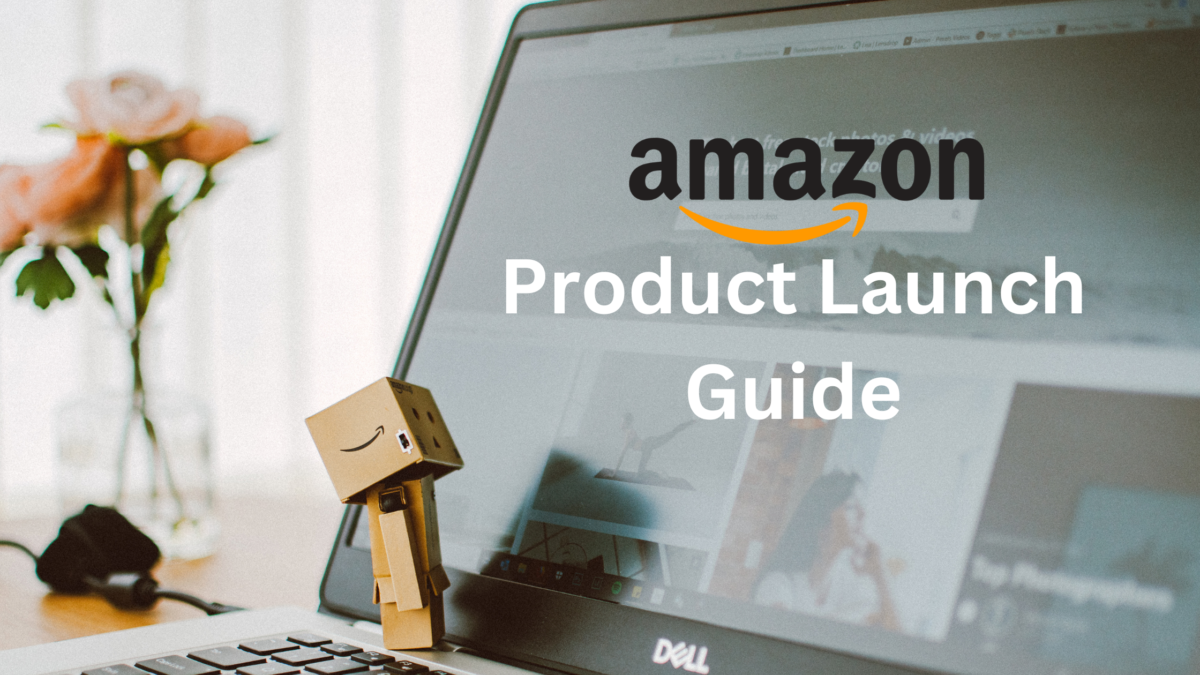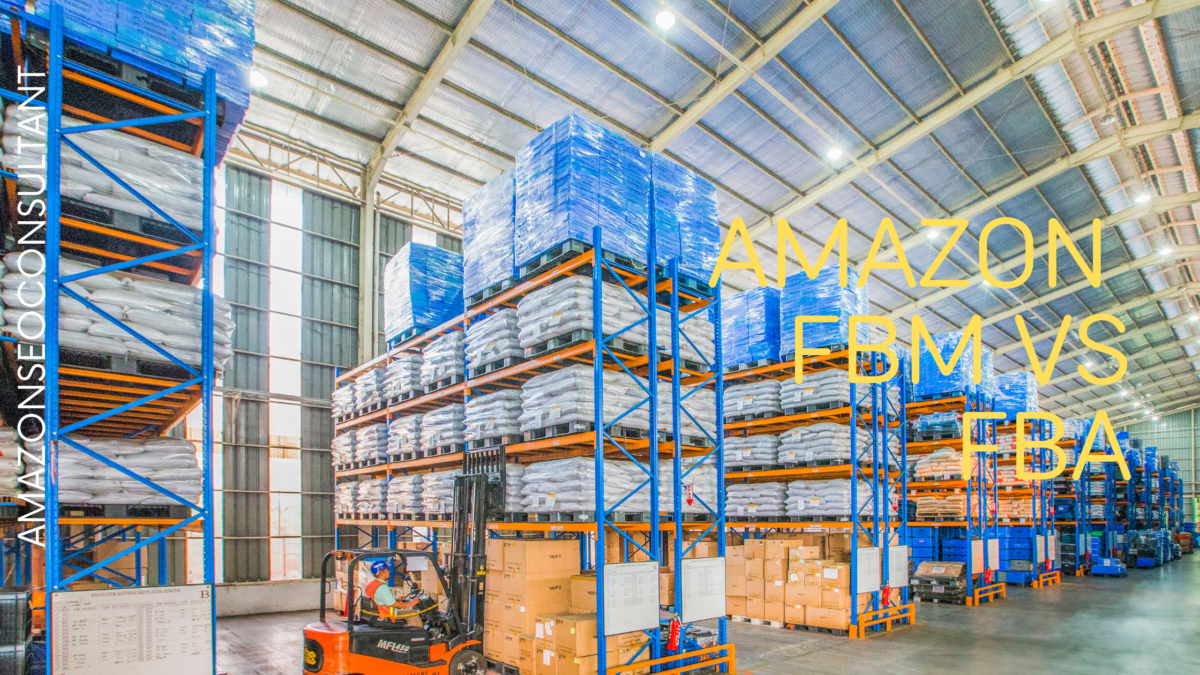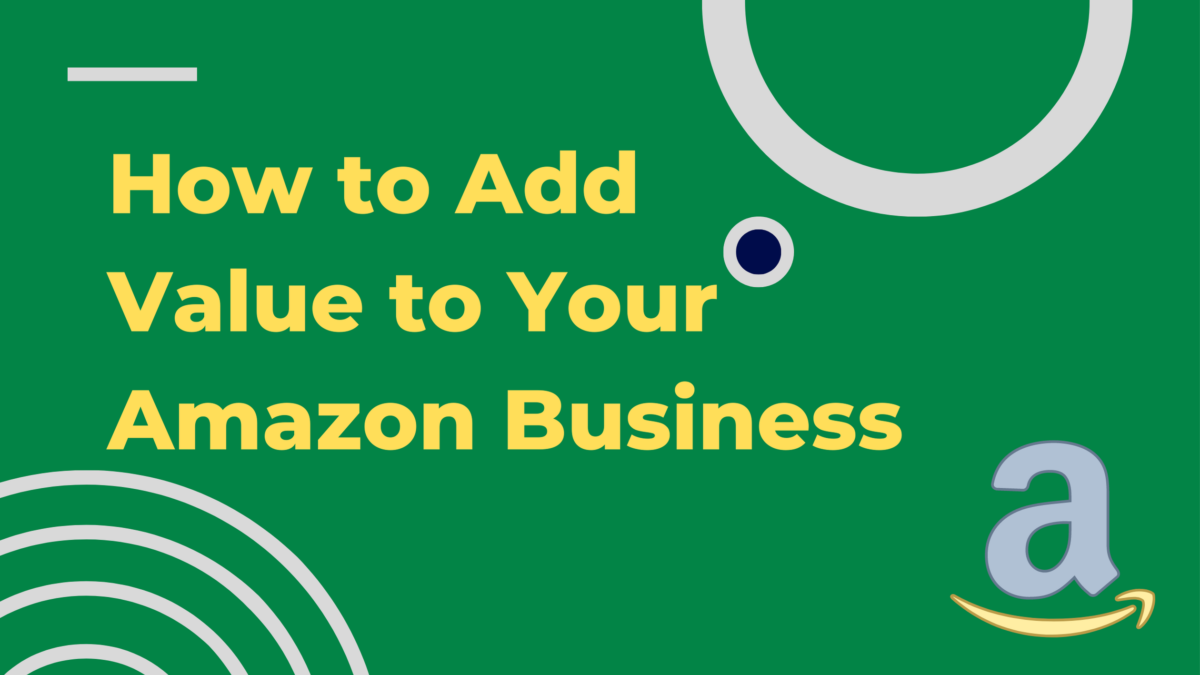For experienced business owners looking to acquire an Amazon FBA (Fulfillment by Amazon) business or expand their existing online ventures, due diligence is a critical process that cannot be overlooked. Conducting comprehensive due diligence is the key to making informed decisions and ensuring the success of your online business acquisition or expansion.
In essence, the term “due diligence” refers to the careful examination and analysis of all relevant aspects of a potential business deal. It involves assessing various factors such as financial records, product reviews, conversion rates, supplier relationships, and more to evaluate the viability and potential risks associated with the business.
A thorough due diligence process enables you to identify any red flags or areas of concern, allowing you to mitigate risks and make informed decisions. It ensures that you have a clear picture of the business’s financial health, product portfolio, and competitive landscape.
This blog post will serve as a guide for experienced business owners, providing an in-depth understanding of the due diligence process for Amazon FBA businesses. From creating a diligence checklist to evaluating product listings, we will explore the key criteria to consider during the diligence period.
Scroll further down to get into it, but if you’re new to this whole concept, let’s start with the basics:
What is due diligence?
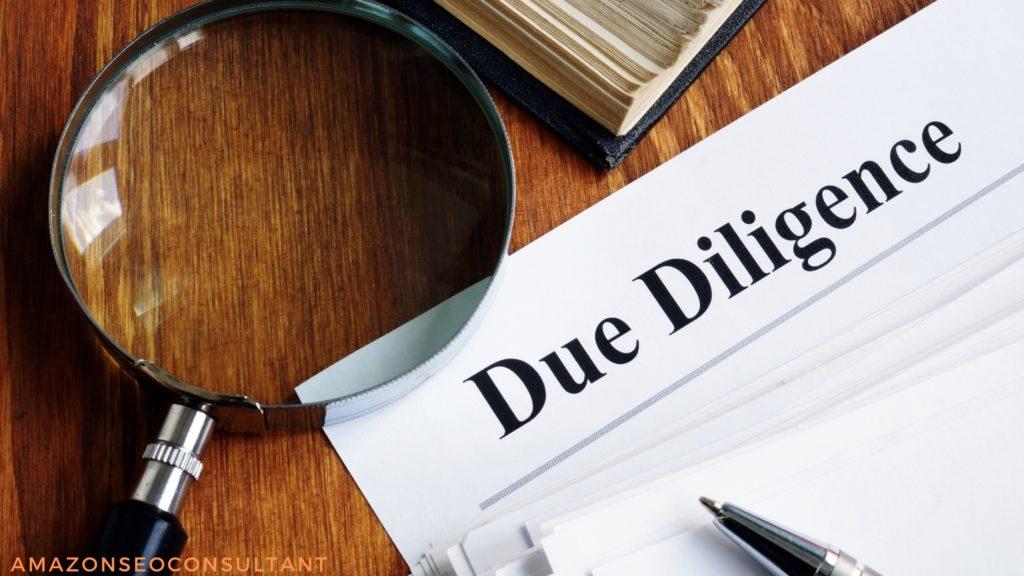
The due diligence process is an essential step for Amazon sellers considering a business acquisition or partnership.
It involves investigating the potential risks, opportunities, and financial health of the target company or business. By conducting due diligence, sellers can ensure that they have all the necessary information to make informed decisions and evaluate the viability of the business deal.
The due diligence process typically includes a thorough review of financial records, tax returns, product portfolio, and supply chains.
It also involves assessing the competitive landscape, product reviews, conversion rates, and defect rates to understand the market position of the business. Additionally, sellers need to evaluate the compliance with legal requirements, workplace safety checks, and any potential human rights risks that may exist.
By undertaking a diligent and comprehensive review, sellers can identify any safety deficiencies, potential business associations, and gauge the competitive advantage of the target company.
Through this necessarily diligent process, sellers can minimize risks, evaluate the potential of the business, and determine an appropriate valuation.
Ultimately, due diligence is crucial for Amazon sellers to ensure a successful and profitable venture in the competitive online marketplace.
Why is due diligence important?

The importance of due diligence cannot be overstated. It allows buyers to uncover any underlying issues or potential business risks that could impact the value and future success of the Amazon FBA business.
By identifying areas for improvement or potential deal breakers, buyers can negotiate for more favorable terms or even withdraw from the deal altogether.
Furthermore, a thorough due diligence process can attract attractive payouts and help close deals quickly. Sellers who have transparent and well-documented information ready for review can instill confidence in potential buyers, resulting in smoother negotiations and expedited transaction processes.
Ultimately, the purpose of due diligence is to empower buyers to make informed decisions and ensure they are investing in a healthy and valuable Amazon FBA business. It serves as a crucial tool for mitigating risks and maximizing the potential for success in online business acquisitions.
Why Buy an Amazon Business Rather than Build my Own?
When it comes to starting an online business, one option that has gained significant traction in recent years is buying an Amazon FBA (Fulfillment by Amazon) business.
Instead of building a business from the ground up, buying an established FBA business offers numerous advantages, including proven concepts, scalability and reduced risk.
One of the main reasons why buying an Amazon FBA business has become so popular is the potential for scalability.
These businesses are built on the robust infrastructure and massive customer base provided by Amazon, allowing for rapid growth and expansion.
With the right strategy and execution of reliable techniques like KWFS campaigns, buyers can offer a proven product directly to a massive existing customer base and take the business to new heights.
Another compelling reason to consider buying an Amazon FBA business is the reduced risk factor. Starting a new business involves a high level of uncertainty and comes with no guarantee of success. In contrast, acquiring an established FBA business means stepping into a proven system with an existing track record of profitability. By analyzing the business’s performance and conducting due diligence, buyers can make informed decisions and mitigate potential risks.
It’s not just individual entrepreneurs who are recognizing the potential of buying Amazon FBA businesses. Wall Street investors and private equity firms have also entered this space, acquiring FBA businesses as part of their investment portfolio. This trend further underscores the credibility and profitability of these businesses.
In conclusion, the case for buying an Amazon FBA business over building one from scratch is strong. The scalability, reduced risk, and recognition by Wall Street investors make buying an established FBA business an attractive proposition.
By acquiring a profitable business in a niche market, entrepreneurs can hit the ground running and enjoy the benefits of an established customer base, product listings, and streamlined operations.
What Makes an Amazing Deal?
When searching for a great deal in an Amazon FBA business, there are several key factors to consider. First and foremost is the product assortment.
A diverse and attractive product portfolio is essential for success. Buyers should look for businesses that offer a wide range of products, covering different categories and catering to various customer preferences. This ensures that the business is not solely reliant on a single product or category, reducing the risk of market fluctuations or changing consumer trends.
Value is another important factor to assess. Buyers should carefully evaluate the financial records, including revenue, expenses, and profitability, to determine whether the business is priced reasonably.
Additionally, it’s crucial to consider the potential for growth and scalability. Look for businesses with untapped potential, such as underperforming products or opportunities to expand into new markets.
Competition with Amazon is a critical aspect to analyze. While Amazon’s dominance in the e-commerce space is undeniable, a great deal comes from finding a business that can effectively compete with Amazon’s offerings. Look for businesses with unique selling points, differentiation through quality or branding, or niche products that are not easily replicated by larger competitors.
Lastly, a well-curated assortment and specialized knowledge are significant in attracting customers.
A business that demonstrates expertise and offers unique products or a curated selection sets itself apart from competitors. Buyers should inquire about the business’s sourcing strategies, relationships with suppliers, and any exclusive product lines.
By offering specialized knowledge and unique products, the business can establish a loyal customer base and differentiate itself from the competition.
In summary, when looking for a great deal in an Amazon FBA business, consider factors such as a diverse product assortment, value and growth potential, competition with Amazon, and the presence of a well-curated assortment and specialized knowledge. These elements contribute to the long-term success and profitability of the business.
Amazon FBA due diligence checklist
Due diligence is a crucial step in the process of acquiring an Amazon FBA business.
It involves conducting a thorough assessment of various factors to ensure that the business is a viable and profitable investment opportunity. Here is a due diligence list to guide you through the most important due diligence criteria when evaluating an Amazon FBA business:
1. Amazon Seller Central Account: Review the seller’s account performance, including sales, conversion rate, defect rate, and late shipment rate. A well-maintained and successful account is an indicator of a reliable business.
2. Product Category and Portfolio: Evaluate the product listings and portfolio to understand the profitability, competitive landscape, and potential for growth. Look for diversified product offerings and consider the demand, margins, and competition within the chosen product category.
3. Supply Chain and Inventory Management: Assess the sourcing strategy, supplier relationships, and inventory management practices. Look for reliable suppliers, proper stock management, and well-maintained supply chains to avoid any disruptions.
4. Financial Records and Tax Returns: Analyze the financial records, tax returns, and expenses to assess the business’s profitability and potential risks. This includes reviewing revenue, expenses, profit margins, and any outstanding liabilities.
5. Legal Compliance and Intellectual Property: Ensure that the business is compliant with all legal regulations and has the necessary intellectual property rights for its products. Identify any potential legal issues or pending lawsuits.
6. Customer Reviews and Feedback: Evaluate the customer reviews and feedback to gauge the product’s quality, customer satisfaction, and brand reputation. Consider both positive and negative reviews to understand any potential issues.
7. Historical Performance and Growth Potential: Examine the historical performance and growth trajectory of the business. Look for consistent revenue growth, scalability, and untapped opportunities to expand into new markets or product lines.
By following this checklist, you can make informed decisions and mitigate potential risks when considering an Amazon FBA business acquisition. Remember, thorough due diligence is vital to ensure a successful and profitable investment.
If you need some more help, here are some specific questions worth asking during the due diligence process:
- Do products go directly from supplier to Amazon? – If so/not could you explain?
- Do you use any 3PLs or external warehouses?
- Could you add us to your Amazon account (read only access obviously)
- Could you provide proof of costs from supplier in the form of an invoice? (supplier information can obviously be hidden)
- How was the business initially marketed?
- How is it currently marketed?
- Do you do any Amazon PPC? If so, please give details
- How were initial reviews processed?
- Inventory Management? Any softwares used?
- Was any active marketing done in the past 12 months? How have sales grown?
- Were reviews purchased at any point?
- Have you had any warnings from Amazon? Suspensions etc?
- Were sales purchased at any point? – Were any promo services used?
- How do you approach negative reviews?
- Have their been any new competitors into the marketplace?
- Any other external ads run for the traffic generation of these products?
- Refund rates per SKU/ASIN?
- Proof of Air Freight / Sea Freight information quotes.
- Current Inventory in-Amazon & Current inventory ordered (will stock-out occur?)
- Could you explain the patents to us (if any) and how they work here?
- How would you personally expand brand further in the future + Other products that could potentially be launched? (Be as detailed as possible)
General points to confirm:
While these aren’t questions per se, you will want to get an understanding of all of these points to be sure a business is worth of acquisition:
- Review of the target’s business plan and predictions
- How realistic are these targets?
- How achievable is the business plan?
- Research and assessment of the market
- Where is the target positioned within the market?
- Where is the market heading? How could this affect the value of the target company?
- What are the trends in the market?
- Analysis of competitors and customer base
- Who are the strongest and weakest competitors?
- Analysis of Supply Chain strength
- How does the target perform against its competitors?
- What is its customer profile? Target Avatar
- Revenue and gross margin modelling
- Will the target reach its projected revenues?
- How much can the target company be expected to make over a set period of time?
- How reliable are these revenues going to be?
- Pricing and margins? Vs Competitors
- How have average prices fluctuated historically?
- What is the forecast for prices in the future?
- Check competitors in the space both ecom and FBA.
- Reviews – volume and negative/positive amounts.
- Major competition coming in with better/same product at better/same price points with better/more reviews.”
Where to Buy an Amazon FBA Business
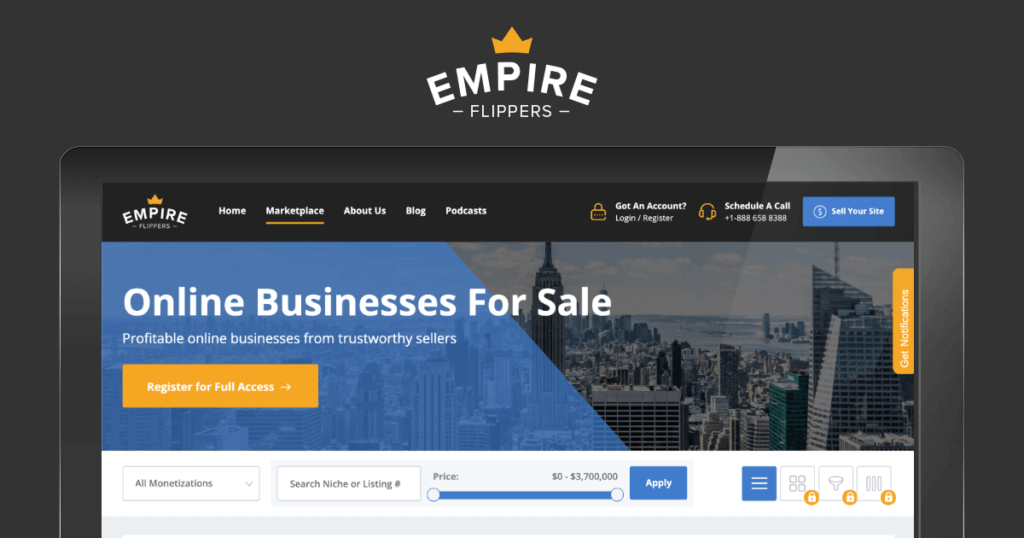
When it comes to purchasing a suitable FBA (Fulfillment by Amazon) business, there are different options available.
One option is to enter into a private sale agreement directly with the seller. This can involve researching and approaching qualified businesses that align with your investment criteria. However, navigating the negotiation process and ensuring a smooth transaction can be challenging for first-time buyers.
Another recommended option, especially for first-time buyers, is to utilize a broker’s service. A broker specializes in facilitating the buying and selling of businesses and can provide crucial protection and support throughout the process. They act as intermediaries between buyers and sellers, ensuring transparency and assisting with due diligence.
One of the advantages of using a broker’s service is the availability of a curated marketplace. Brokers often have a portfolio of pre-vetted FBA businesses that meet certain quality standards. This saves buyers valuable time and effort in finding suitable businesses to evaluate.
Furthermore, by engaging with a broker, buyers can benefit from the guidance and expertise of experienced business analysts. These professionals can help buyers assess the potential of a business, analyze financials, and provide insights into the competitive landscape. This expertise can prove invaluable in making informed investment decisions.
Overall, utilizing a broker’s service provides numerous advantages, particularly for first-time buyers in the FBA business arena. It offers protection, support, and access to a curated marketplace, making it easier to find qualified businesses and navigate the complexities of the buying process.
To learn more, take a look at our review of Empire Flippers the leading Amazon fba business broker, or our guide to exiting the Amazon business.
If you need help buying or selling Amazon businesses, or boosting their value through proven techniques such as KWFS, consider dropping us a message.
